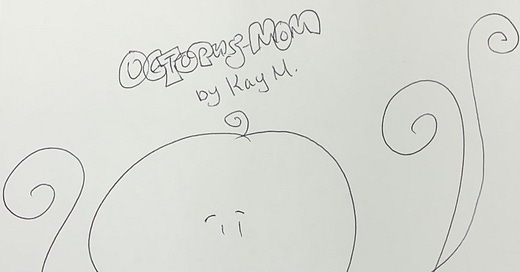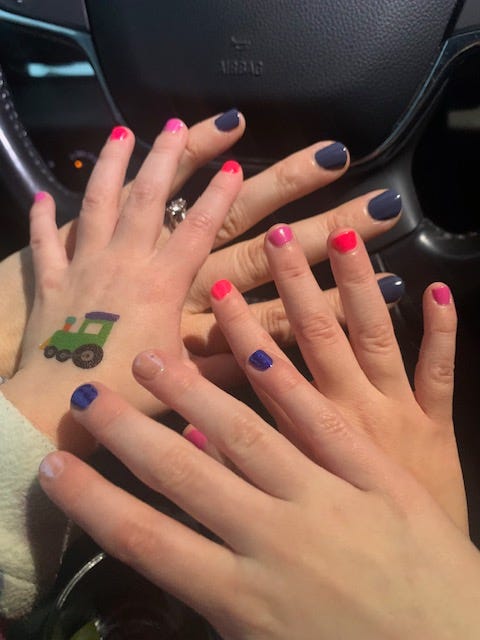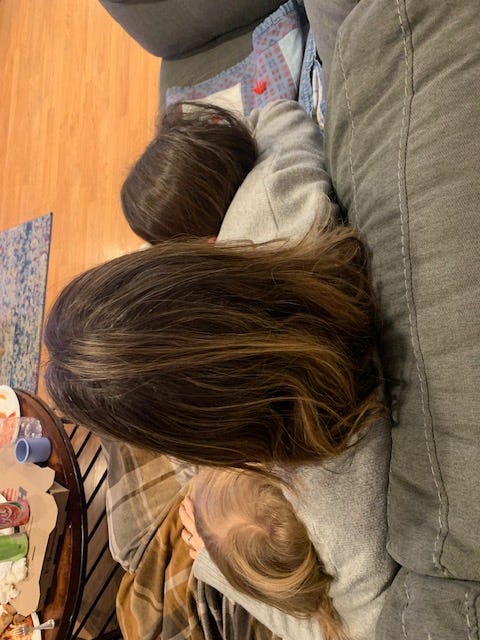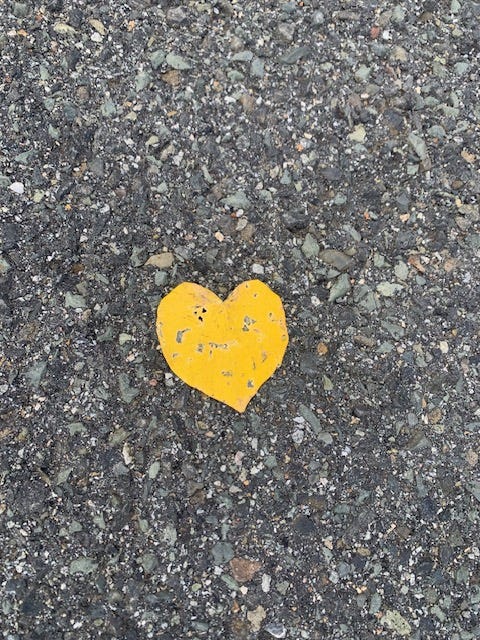Alloparents & The Octopus Mom
Research demonstrates the benefits of shared parenting...because most moms don't have eight arms. Why the "alloparenting" concept is good for babies AND moms.
“Please pass the salt”
On Christmas day, my extended family and I had just settled into eating a delicious, home-cooked meal, when someone asked if I could “pass the salt.”
Before I had a chance to respond, my oldest daughter—age six, and very spirited—stabbed her fork into a brussels sprout and announced, “My Mommy isn’t an Octopus. She doesn’t have 8 arms!!” Then proceeded to munch happily away while everyone laughed.
Her comedic timing was spot on, but I think she was being quite literal, as she parroted a phrase she’s heard me use during moments of frustration (usually in the kitchen at dinnertime), when everyone needs something from me all at once and I feel overwhelmed.
The truth is, I say I’m not an “Octopus Mom” but here in our American culture, I kind of act like one, for better or worse. But isn’t that what our culture today demands of us?
“We have all felt it in our bones — the stress of the bubblegum-and-duct-tape child care system in America,” says
, PhD, who writes and researches . She and her colleague, , a reproductive psychiatrist in New York, recently published an NY Times Op-Ed calling out a wonderful, but overlooked, truth: that childcare is healthcare!… Many days, even with the help of my husband, babysitters, a housecleaner and friends, I try to do so many things for my kids and home all by myself. I’m probably at one of the best points in my life where I’m delegating and asking for help more than I ever have before, yet I still find myself juggling many tasks at once, and my stress originates from this place of overload and at times, a sense of inadequacy.
writes, “Watching the slow motion collapse of an already tenuous system is terrifying on so many levels. Collapse of the child care system will affect our economy. It will set back decades of progress towards women’s advancement in the workforce and economic freedom. It will also expose many more American parents to the stressors related to child care, adding to the increased risk for mental health challenges and other stress-related ailments. We saw this effect during the pandemic. We could see it again.”
Alloparents
Last month, NPR put out a great article about “alloparents,” or helpers/caregivers (“allo” means “other” in Greek) who provide extra support DAILY in the process of raising children. These “other” people help with childrearing responsibilities like holding, cleaning, watching and soothing one child.
The article highlighted a particular study published in Developmental Psychology, in which researchers followed a tribe called Mbendjele, based in the northern rainforests of the Republic of Congo, Africa. In the study, Nikhil Chaudhary, an evolutionary anthropologist, observed 18 young children age 0 to 4, for 12-hour increments. The study noted that, “crying was virtually always responded to rapidly via comforting and never via scolding. Children received physical contact and care for the majority of the day.” Either these folks were on their best behavior for the researchers, or group parenting is the healthiest way to raise kids!
…Furthermore, the study went on to say that the tribe had extensive “allomothering” networks, though the caregiving itself was still highly concentrated, such that sharing of caregivers was limited and, “a child typically had several allomothers who directed a majority of their allomaternal effort to him/her.”
WOW!
It sounds like the Mbendjele women are more relaxed, or at least less irritable? Is it because they share child-rearing responsibilities and get encouragement from each other? Are they less isolated, & less burned out than Western women?
Less Scolding, More Soothing
I don’t know about you, but I think the study’s findings are fascinating. Especially the part where researchers observed crying children being comforted without scolding - that seemed significant. Usually, if I scold one of my kids when they’re crying, it’s because I’m irritable, tired, or stressed and they’ve done something annoying (or something I’ve explicitly asked them not to do), and there’s no one to pass the baton to at the moment. It’s not ideal, and I try hard to be calm with them, but I also get irritable with them regularly.
More Hugging
Secondly, I found it significant that the Mbendjele children received physical contact and care for the majority of the day. This sounds wonderful. Do we have the opportunity to do this in Western society today? I don’t think we are set up for this to be a reality yet, although I wholeheartedly support moving our society in this direction.
I think Americans place more emphasis on institutional systems that are “safe” (this is true of nursing homes and long-term care facilities, too) and “academic” (schools) rather than thinking creatively about how we can de-emphasize performance and prioritize human connection and warmth, instead.
I try to give my kids as much physical contact as I can (we make snuggling a priority at bedtime, and I attempt to be intentional about giving them hugs and back rubs before and after-school), and my husband is also a present dad and will tickle and play “horsey” with them as well as read to them…but these things don’t occur constantly throughout the span of 12 hours each day. Rather, they are peppered in. For at least 6 hours of the day, the girls are in school and receiving instruction from their teachers, which is certainly not a small ratio of 3 or 4 teachers to one child (more like 1 or 2 teachers to 20+ children). Plus, for the most part, teachers are usually cautioned against displays of physical affection/caring for students. This is sad to me, because I think the majority of teachers would be healthy and well-intentioned in giving their students hugs or positive physical contact.
And I can’t help but wonder, how many children right now receive very little or no positive physical touch from their caregivers? (Not by fault of the caregivers, per se, but because their caregivers are working to put food on the table, are emotionally unavailable, or are struggling with mental health problems).
What do you think? … Is the solution to raise awareness that positive physical touch/bonding is critically important for the healthy development of babies and children? Or is it to raise awareness while also working to change our systems and structures that don’t support free childcare, flexible work schedules, and slow parenting?
The implications of the Mbendjele study are important, because the results build off of prior research, which suggests that children are evolutionarily primed to expect a high level of sensitive, responsive caregiving, as well as lots of positive physical touch.
It’s in line, for example, with other studies that psychologists reference frequently to show the importance of emotional warmth between a parent and offspring as being a major factor for healthy child development; for example, the Harlow monkey study, and Mary Ainsworth’s Attachment Theory. The Harlow money study (1958 - which would be considered unethical by today’s research standards), demonstrated that a mother’s tactile, emotional comfort is more important to a rhesus monkey baby’s attachment, than food.
Alloparenting is more than just good for babies, it’s good for Moms.
I couldn’t help but notice that the alloparents study was focused on the baby’s/children’s health moreso than the health impact on the mothers themselves. As Molly Dickens has pointed out in her work for
, healthcare research has long focused on the child over the mother, and this needs to change. Not that we should focus less on the child but that we can research more (translation: fund more research) on the well-being of mothers.The truth is, even if I was “Octopus Mom” and could do it all because I had 8 arms, I think I would get lonely. There is something significant about bringing multiple caregivers together to raise children, whether we are talking about the Mbendjele tribe in the Republic of Congo, or childcare in America. Not only does a group parenting arrangement benefit the well-being of the baby/child who is getting more attuned and loving care, but I believe it also provides more support to the mother, who, well, frankly has friends now. She isn’t isolated any longer, and benefits from feeling connected and “held” by this network of allomothers. “You are not alone” “I’m here for you and your family” and “We’ve got this, together” seem to be the theme.
….Anybody else out there an Octopus Mom who wants to make friends?
Warmly,
Kay
***
Citations:
“Bringing up a baby can be a tough and lonely job. Here’s a solution: alloparents.” Michaeleen Doucleff. December 1, 2023. (NPR) Link: https://www.npr.org/sections/goatsandsoda/2023/12/01/1216043849/bringing-up-a-baby-can-be-a-tough-and-lonely-job-heres-a-solution-alloparents
Chaudhary, et al. (Nov. 2013) Sensitive responsiveness and multiple caregiving networks among Mbendjele BaYaka hunter-gatherers: Potential implications for psychological development & well-being. https://pubmed.ncbi.nlm.nih.gov/37956035/
Harlow & Harlow (1962). Social Deprivation in Monkeys. https://www.jstor.org/stable/24936357
The Bowlby-Ainsworth Attachment Theory. (2010).
New York Times Opinion by Molly Dickens, PhD and Lucy Hutner, MD. (January 2024.)
Disclaimer: the content on Substack’s “The Mom Diaries” of “Momffirmations” posted by Kay M. (@themomdiaries and https://substack.com/@themomdiaries) and on YouTube (@TheMomDiariesbyKayM) or any other medium or social media platform (the “information”) is for educational and entertainment purposes only and is not intended to be a substitute for clinical, medical, legal and professional advice, diagnosis, or treatment. Reliance on any information provided by Kay M. or The Mom Diaries or Momffirmations is solely at your own risk. Always seek the advice of your licensed mental health professional, medical doctor, or other qualified health provider.
A shout-out to a few of the lovely and powerful Mom Diaries community of women!









I talk to my mom clients about this often- mothers were never supposed to be this isolated! It feels hard because it is so hard.
As I’m only just entering motherhood, this piece I’ll hold onto. I’m already struggling with asking for help (partly bc I want to prove to myself that I can still do the things prior to baby,so pride I guess is my issue). But it’s such a beautiful image of togetherness, especially from the context of baby, always being cared for, soothed and comforted. Thank you for this piece, Kay!